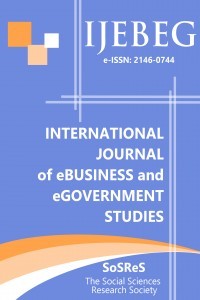THE EFFECTS OF E-COMMERCE ON SUPPLY CHAIN IN TURKEY
THE EFFECTS OF E-COMMERCE ON SUPPLY CHAIN IN TURKEY
Electronic commerce (e-commerce) and the internet are fundamentally changing the nature of supply chains, and redefining consumer reaction in supply chain era. In addition to standard forms for business-to-business transactions, ecommerce encompasses much wider activity. A new form of cooperation known as a virtual company, performing some of the processes needed to manufacture a product or deliver a service, has flourished. Nowadays, promoting the development of electronic commerce is one of the key factors in the most competitive and dynamic knowledge-based on business economy. In this paper, the general information about e-commerce will explain. The economical affects of E-commerce both consumer and producer side will highlight. Then, the application and indicators of using E-Commerce in Turkey and recent developments in e-commerce such as security will emphasize.
Keywords:
E-Commerce Supply Chain, Business Commerce, Turkey.,
___
- Andam, Zorayda Ruth.UNDP “E-Commerce and e-Business, -APDIP The e-ASEAN Task Force and the UNDP Asia Pacific Development Information Programme (UNDP-APDIP), e-Asean Task Force, 2003
- Awad, E., (2003) “Electronic Commerce”, 2nd edition, Pearson Education, USA.
- Center for Democracy and Technology Database (2006), “E-government” www.cdt.org/legislation/107th/egov/ accessed on 6/3/2010.
- Dai, Qizhi (2001), “B2B E-Commerce Revisited: Leading Perspectives on the Key issues and Research Direction, Carlson School of Management University of Minnesota
- Minneapolis, Doctoral Program MIS Research Center , Minnesota. Ecommerce Statistics Database (2010) www.ystats.com/uploads/report_abstracts/765.pdf?PHPSESSID=723056e2f5eb47509dd2 cf28697bcc56.
- Kuwayama, Mikio (2001) “E-Commerce and export promotion policies for Small and Medium-Sized Enterprises: East Asian and Latin American Experiences” International
- Trade and Integration Division- Santiago, Chile. Maamar Zakaria (2003), “Commerce, E-Commerce, and M-Commerce: What Comes
- Next?” Communication of the ACM, Vol. 46, No. 12 pp.257 Rudnick, Piper (2004) “E-Business: The E-Business Legal Survival Kit” J.T.
- Westermeier Lee J. Plave LLP,,2004 www.bbbonline.org/eexport [Accessed 17.03.2011]
- IPC E-Business and Supply Chain Committee (2000) The Myths of E-commerce, (2000) http://www.ipc.org/4.0_Knowledge/4.1_Standards/E- [Accessed 8.02.2011]
- IPC White Paper (2000) www.ipc.org/4.0_Knowledge/4.1_Standards/E
- CommerceWhitePaper.pdf [Accessed 7.03.2011]
- The Interbank Card Center -BKM (2011) Database www.bkm.com.tr/bkm- en/istatistik/sanal_kart_ile_yapilan_eticaret_islemleri.asp [Accessed 7.03.2011]
- Turkey Key Statistics Telecommunication Market (2011) www.budde.com.au/Page-Not
- Found.aspx?404;http://www.budde.com.au/Reports/Contents/Turkey-Key-Statistics- Telecommunications-Market-Overview-and-Internet-2411.html [Accessed 3.02.2011]
- Turkey-Top-100-E-Commerce-Players Database (2011), www.reportlinker.com/p0209283/Turkey-Top-100-E-Commerce
- Players.html#ixzz1IGKX1nRl [Accessed 7.03.2011]
- United Nations Conference on Trade and Development (2005) “E-Commerce and Development Report”, United Nations, New York and Geneva,
- UNCTAD./doc/PlavePiperEComEBusLegalKit.pdf [Accessed 5.03.2011]
- UNCITRAL Report (1998) “Model Law on Electronic Commerce with Guide to
- Enactment 1996 with additional article 5 bis as adopted in 1998”, United Nations, www.uncitral.org/pdf/english/texts/electcom/05-89450_Ebook.pdf [Accessed 2.02.2011]
- Turkey Internet Indicators (2010) www.cia.gov/library/publications/the-world- factbook/rankorder/2184rank.html?countryName=Turkey&countryCode=tu®ionCode
- =me&rank=26#tu [Accessed 15.03.2011]
- International Telecomunication Union Facts and Figures Database (2011) http://www.itu.int/ITU-D/ict/material/FactsFigures2010.pdf [Accessed 7.03.2011]
- Başlangıç: 2009
- Yayıncı: Sosyal Bilimler Araştırmaları Derneği
Sayıdaki Diğer Makaleler
INTERNET MARKETING IN THE PUBLIC SECTOR: THE CASE OF INVESTMENT PROMOTION AGENCIES
İddi MAKOMBE, Muhajir KACHWAMBA
METHODOLOGY FOR GENERATION OF CORPORATE NETWORK HOSTNAME
Allan Mac Quinn GARRİGÓS, Renato José SASSİ
SOPHISTICATION OF E-SERVICES IN TURKISH PROVINCIAL MUNICIPALITIES: RECENT STATUS
INTEGRATION OF TURKISH EID WITH E-GOVERNMENT & E-BUSINESS SERVICES
Oktay ADALİER, Mucahit MUTLUGUN, Ahmet Fatih MUSTACOGLU
THE EFFECTS OF E-COMMERCE ON SUPPLY CHAIN IN TURKEY
Gülsüm AYDIN, Sibel BAYAR ÇAĞLAK, Güler ALKAN
Fazli YİLDİRİM, Gonca TELLİ YAMAMOTO
DOES INFORMATION TECHNOLOGY CAPABILITY IMPROVE BANK PERFORMANCE? EVIDENCE FROM TURKEY
WOMEN EXCLUDED OR EMPOWERED? A CASE FOR DIGITAL LOCAL AGENDA IN EUROPE
